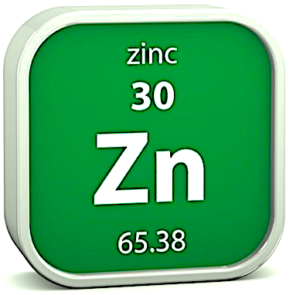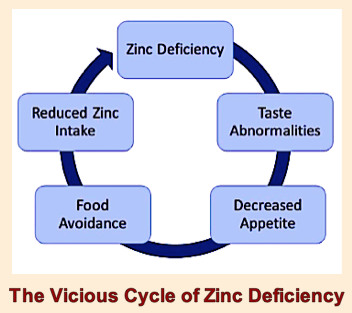We at ‘Fluoridation Australia’ include
this information on zinc because:-
.
FLUORIDES ARE ANTAGONISTS OF ZINC
See our post on zinc ⇓
FLUORIDE & THE ZINC LINK — Leo Spira +
.
~ Zinc and Anorexia Nervosa ~
We are only including page 117 – 118 on Zinc,
however this paper is a mine of valuable
information and we recommend it.
.
.
This ‘SLIMMERS DISEASE’ now seriously affects about
10,000 patients in the U.K., [Old stats.] mostly girls, and is conventionally viewed as of a psychosocial of sexual origins- ‘All in the mind’, ‘Defective body image’, ‘Middle class values’.Even food is seen to have sexual symbolism in psychiatry.
.
But psychiatric treatment based on these theories is notoriously ineffective and the condition is sometimes fatal.
In contrast, we have been able to develop an effect treatment based on the recognition that although anorexia nervosa may involve contributions from certain social factors, the predominant factor is usually chemical – zinc deficiency.
.
We do not doubt that the initial reduction in food intake results mainly from social factors such as the pervasive association of thinness with sexual attractiveness. However, a point is liable to be reached at which starvation, as with other stresses, paradoxically caused increased loss of zinc in the urine, thereby exacerbation the effects of reduced intake.
As the zinc status declines, impairment of the zinc-dependent sense of taste and smell can be expected to reduce further the desire for food. Mental depression, a known symptom of zinc deficiency, makes a bad situation worse.
.
We reasoned that the vicious circle would be broken by providing extra zinc: the other inevitable dietary deficiency would normally be automatically remedied as soon as the patients started eating normally and their mental depression abated. This new approach has proved gratifyingly successful in the hands of my medical collaborators,
Drs. R.I. D. Simpson and D. Latto.
Anorexia nervosa together with various other neurotic, compulsive, or depressive mental states, now appears to be easily curable by provision of 15-150 mg Zn [per day] (66-660 mg ZnSO 4 . 7H2O) in the majority of cases where zinc deficiency is diagnosed as a factor by the ‘taste test’ ♦. Improvement is often apparent within days or sometimes hours even in patients where the illness has been long standing.
.
Our published reports have stimulated an extensive correspondence with doctors, and their patients and patient’s relatives in the U.K. and abroad, together with articles in the press and radio and television programmes. Although it has not as yet proved possible to organise a controlled clinical trial, up to the time of writing, 12 months after our first report in the Lancet, only one case of anorexia nervosa that failed to respond to zinc has been reported to us. Moreover, Dinsmore et al. have recently reported that patients with anorexia nervosa have an abnormality of zinc metabolism consistent with malabsorption from the gut.
Such individuals would clearly be heightened risk of developing a pathological state of zinc deficiency if they embark on a ‘slimming’ diet.
.
The zinc deficiency in modern diets can probably be attributed to three modern agricultural practices:
1) the use of phosphate fertilisers which render zinc less readily taken up by growing plants
2) the failure to maintain the organic contents of many agricultural soils, which has a similar effect on zinc uptake
3) the common failure to re-cycle zinc (and other nutritionally essential trace elements) to soils. Concerning (2), a Government survey has revealed that the organic content in much U.K. arable farmland has fallen to about 2-4% in comparison with 10-20% for typical virgin grasslands. Slowly renewing natural resources like soil (and oil for that matter) are being ruthlessly exploited or adverse side effects, e.g. declining nutritional quality of food.
Anorexia nervosa and other abnormal mental states would appear to be among the consequences…
.
The paper continues on with the problems with Pre-natal Development and Trace Elements foetal brain, post-natal intelligence,
behavioural characteristics, still-births, and malformations.
4) In Australia almost all soils are naturally zinc deficient.
5) Fluorides in water, air, food – 1 Pharmacological drugs
and would also add insult to injury. – 2 More On Zinc
.
♦ Zinc test kits are available from most
health food stores in Australia.
.
We at ‘FLUORIDATION AUSTRALIA’ thank
you for this monumental work.
You may also be interested in more information on zinc and diet:
Zinc is used for treatment and prevention of zinc deficiency and its consequences, including stunted growth and acute diarrhoea in children, and slow wound healing.
It is also used for boosting the immune system, treating the common cold and recurrent ear infections, and preventing lower respiratory infections.
It is also used for malaria and other diseases caused by parasites.
Some people use zinc for an eye disease called macular degeneration, for night blindness, and for cataracts. It is also used for asthma; diabetes; high blood pressure; acquired immunodeficiency syndrome (AIDS); and skin conditions such as psoriasis, eczema, and acne.
Other uses include treating attention deficit-hyperactivity disorder (ADHD), blunted sense of taste (hypogeusia), ringing in the ears (tinnitus), severe head injuries, Crohn’s disease, Alzheimer’s disease, Down syndrome, Hansen’s disease, ulcerative colitis, peptic ulcers and promoting weight gain in people with eating disorders such as anorexia nervosa.
Some people use zinc for benign prostatic hyperplasia (BPH), male infertility, erectile dysfunction (ED), weak bones (osteoporosis), rheumatoid arthritis, and muscle cramps associated with liver disease.
It is also used for sickle cell disease and inherited disorders such as acrodermatitis enteropathica, thalassemia, and Wilson’s disease.
.
Some athletes use zinc for improving athletic performance and strength.
Zinc is also applied to the skin for treating acne, aging skin, herpes simplex infections, and to speed wound healing.
There is a zinc preparation that can be sprayed in the nostrils for treating the common cold.
Zinc sulfate is used in products for eye irritation.
Zinc citrate is used in toothpaste and mouthwash to prevent dental plaque formation and gingivitis.
Note: Many zinc products also contain another metal called cadmium. This is because zinc and cadmium are chemically similar and often occur together in nature. Exposure to high levels of cadmium over a long time can lead to kidney failure.
The concentration of cadmium in zinc-containing supplements can vary as much as 37-fold.
Look for zinc-gluconate products.
Zinc gluconate consistently contains the lowest cadmium levels.
How does it work?
Zinc is needed for the proper growth and maintenance of the human body.
It is found in several systems and biological reactions, and it is needed for immune function, wound healing, blood clotting, thyroid function, and much more. Meats, seafood, dairy products, nuts, legumes, and whole grains offer relatively high levels of zinc.
.
Zinc deficiency is not uncommon worldwide, but is rare in the US.
[ Very common in Australia ] Symptoms include slowed growth, low insulin levels, loss of appetite, irritability, generalised hair loss, rough and dry skin, slow wound healing, poor sense of taste and smell, diarrhoea, and nausea. Moderate zinc deficiency is associated with disorders of the intestine which interfere with food absorption (malabsorption syndromes), alcoholism, chronic kidney failure, and chronic debilitating diseases.
.
Zinc plays a key role in maintaining vision, and it is present in high concentrations in the eye.
Zinc deficiency can alter vision, and severe deficiency can cause changes in the retina (the back of the eye where an image is focused).
Zinc might also have effects against viruses. It appears to lessen symptoms of the rhinovirus (common cold), but researchers can’t yet explain exactly how this works. In addition, there is some evidence that zinc has some antiviral activity against the herpes virus.
Low zinc levels can be associated with male infertility, sickle cell disease, HIV, major depression, and type 2 diabetes, and can be fought by taking a zinc supplement.
See also ⇒ Zinc & Alcoholic Liver Disease
See also ⇒ Zinc, Alcohol Damage, & Thyroid Function
Unlike humans ⇒ Rats produce vitamin C .
⇑ A recommended read ⇑
More ⇒ Zinc Protection From Fluoride-Induced
More ⇒ Testicular Injury in the bank vole
Zinc Status in Human Immunodeficiency Virus Infection +
.
TEN HEALTH BENEFITS OF ZINC
.
Zinc is an essential mineral, critical to human health because it is found in every tissue in the body and is directly involved in cell division.
Like many natural minerals, the importance of zinc to human health has to do with preventing zinc deficiency. While not having enough zinc in your diet can cause health problems, too much zinc intake in the body can be toxic and lead to a variety of health conditions as well. It is extremely important to balance zinc levels properly. Perform a zinc level test or consult a physician before taking zinc supplements.
.
HERE ARE 10 HEALTH BENEFITS OF ZINK:
Cancer Prevention
Maintaining proper levels of zinc in the body, is an essential part of cancer prevention.
Zinc deficiency may play a crucial role in the development of many types of cancer, particularly prostate cancer. In a study with rats, zinc helped prevent the proliferation of prostate cancer cells. While zinc in and of itself does not prevent or cure cancer, it is needed to maintain a healthy immune system and may have antioxidant properties that help to fight conditions associated with cancer.
.
Cancer Treatment Zinc supplements may help curb the side effects of cancer patients receiving radiation therapy. It helps to stimulate the taste buds and research shows can reduce the instances of mouth sores.
.
Immunity Support Adequate levels of zinc help maintain a healthy, productive immune system. While taking zinc supplements is known to help boost the immune system of a zinc deficient person, it has not been proven to help people with healthy levels of zinc in their body. In fact, an overabundance of zinc can actually weaken the immune system.
.
Heart Health Avoiding zinc deficiency is key to preventing cardiovascular disease. Not only does a shortage of zinc contribute to higher cholesterol and increased inflammation, but can actually amplify the negative effects of these and other conditions resulting from poor cardiovascular health.
.
Antioxidant Zinc is considered a powerful antioxidant that helps to prevent free radical damage and oxidative stress to the body’s cells.
.
Athletic Strength & Performance Zinc plays an important role in the production of three hormones considered essential for developing and maintaining muscle strength: testosterone, growth hormone and growth factor-1.
.
Reproduction & Fertility Zinc plays a critical role in the reproductive health and fertility of both men and women. It is essential for proper hormone production. In women, zinc is necessary for the growth process of the egg and the proper function of oestrogen. In men, zinc helps balance testosterone levels and may help to boost the libido.
.
Diabetes Zinc deficiency can lead to a lower level of insulin sensitivity and greater intolerance to glucose. Maintaining good zinc levels may help patients suffering from diabetes and even help to prevent the development of diabetes.
.
Brain Health & Alzheimer’s Zinc helps the body to detoxify metals and remove high levels of minerals like iron from the brain. This process is necessary to maintain healthy brain tissue and good brain function and may play a significant role in reducing the chances of developing Alzheimer’s disease.
.
ADHD Zinc may play a role in treating attention deficit hyperactive disorder. Studies show that children suffering from ADHD generally have notably lower zinc levels than those that do not.
All content published on HealthDiaries.com is provided for informational and educational purposes only. HealthDiaries.com does not provide medical advice, diagnosis or treatment. The site and its services are not a substitute for professional medical advice and treatment. Always seek the advice of your doctor before making any changes to your diet, health routine or treatment. (***)
HealthDiaries.com is a participant in the Amazon Services LLC Associates Program, an affiliate advertising program designed to provide a means for sites to earn advertising fees by advertising and linking to amazon.com.
.





